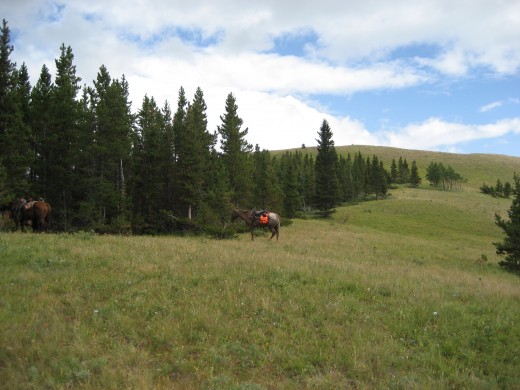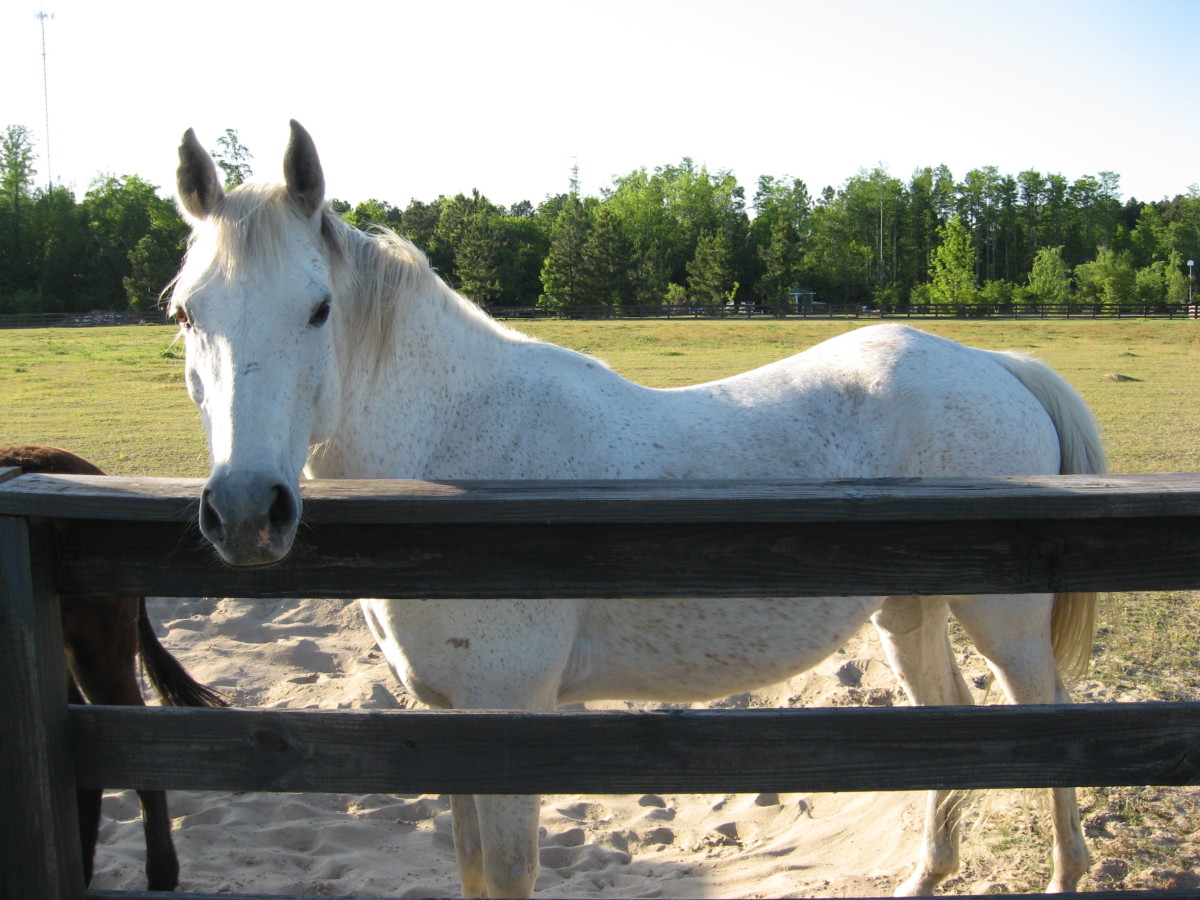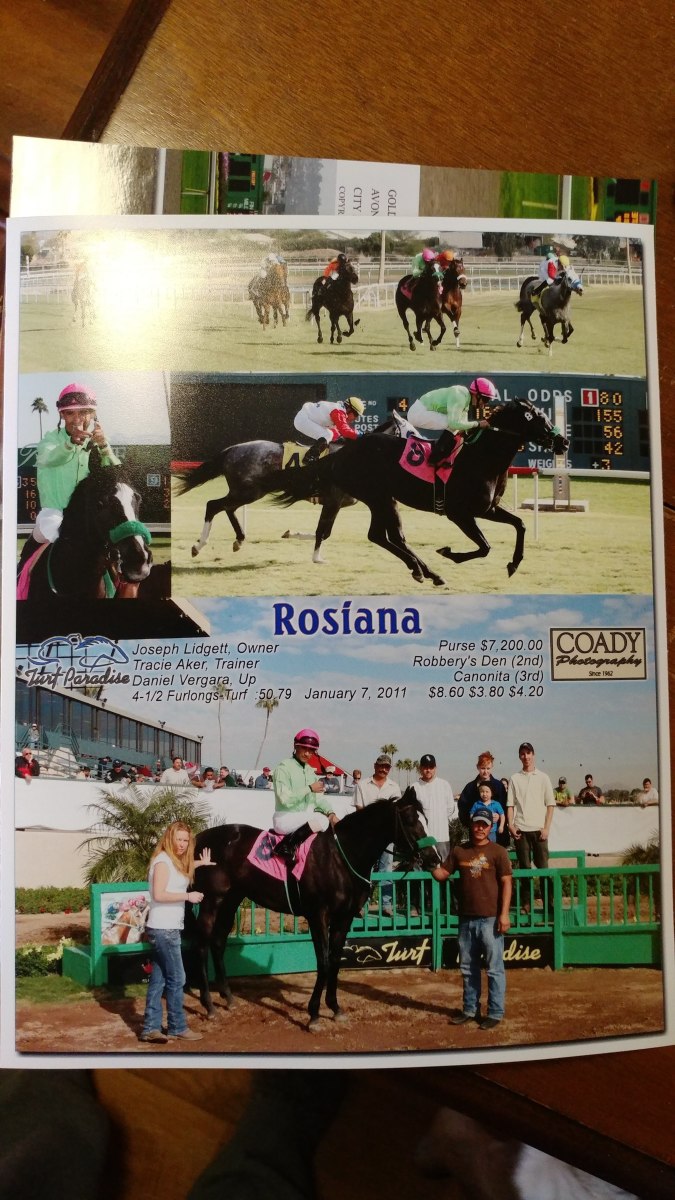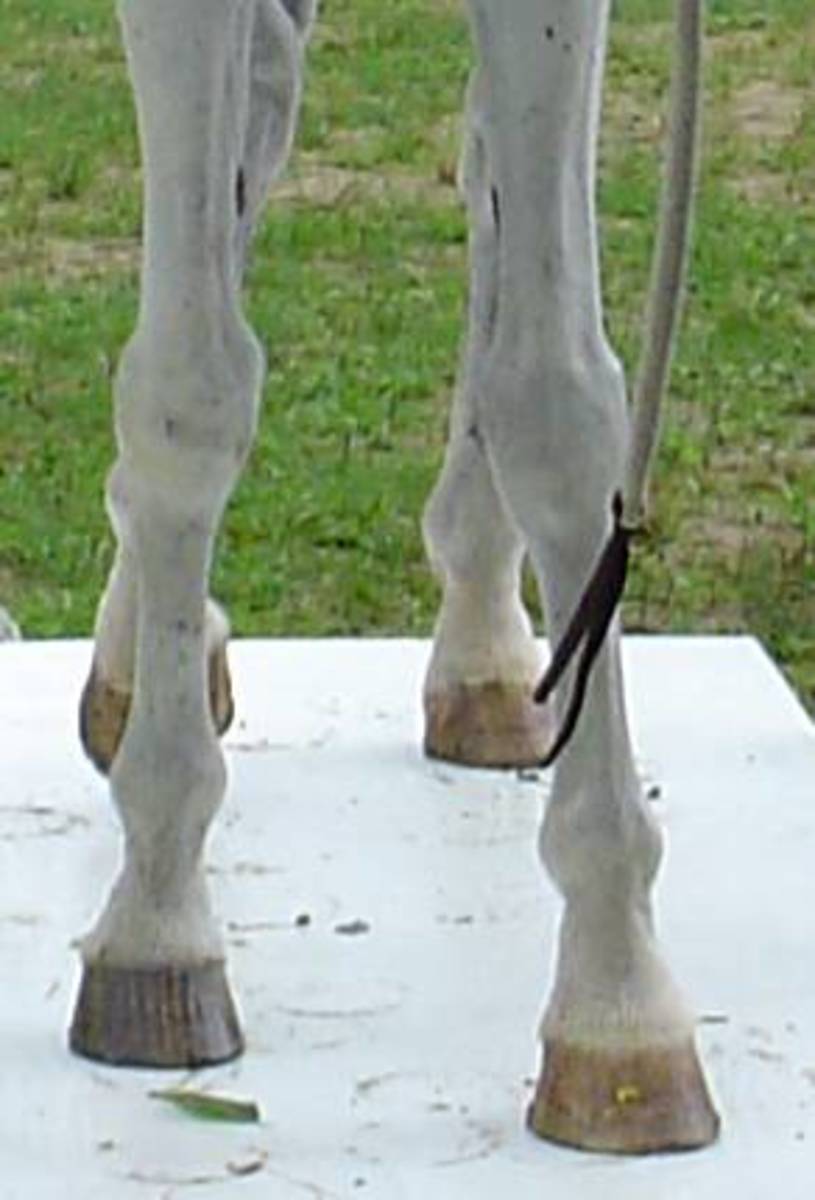Why Is My Horse Behaving Badly?
When Horses Behave Badly
Maybe your beloved equine companion just tried to kick or bite you. Or he slammed your leg into the arena wall or the nearest tree. Or she just won't do that jump, or he decided to drag you down the barn aisle.
Heck, maybe he bucked you off...aiming directly at the manure heap. The immediate temptation is to go find a whip or a set of spurs and teach the so-and-so a lesson. Before doing so, though, stop. And think for a moment on why he or she may be acting like a brat. There might be a good reason for their 'bad' behavior. (Or they may just need some more training).

Pain
One thing anyone who works with horses at all should get into their head is this: The leading cause of bad behavior in horses is pain.
Horses can't talk. They can't say 'Ow' or 'That hurts'. Instead, they have to communicate the fact that they are in pain by some less direct method. Sudden misbehavior in a well-trained and otherwise well-behaved equine is very likely to be pain. Horses may also misbehave because of the anticipation of pain.
For example, Trust Me, a 16 year old Thoroughbred, threw a couple of vertebrae out in his back. He received chiropractic treatment and was rested for two months. In order to help prevent this from happening again, he was also seen by a professional saddle fitter and his saddle was changed. When he was brought back into work, there was no longer any veterinary reason for him to be in pain. Despite this, the first time a rider mounted him he dropped his back (this is sometimes called being cold backed) and then minced around the arena as if he was in absolute agony. Horses have very good memories and a very poor grasp of things changing over time. Last time anyone rode him, it hurt. So he was convinced this time it would hurt too. After about five minutes, he sighed, relaxed and started to go normally - clearly that was about when he realized it wasn't hurting and it wasn't going to hurt.
Cold backed behavior is often a sign of current or past back pain and may indicate a poorly fitting saddle. Aggression when being girthed can also indicate a poorly fitting saddle, although I have found that if the saddle fits normally, changing to a stretch girth cures this problem immediately. A horse that does not want to go forward may well be lame or 'sore'. A sudden refusal to be bridled probably indicates that it's time to call the equine dentist. Here's another story about pain:
Rock, a teenaged Quarter Horse was always a very willing and forward going animal...in fact, he had to be watched carefully because he would hide being lame so he would get to work. So, it was an absolute shock when this beautiful, forward going animal suddenly refused to leave his stall and had to be dragged into the arena. Thinking he was just tired after some extra work, the rider got on him anyway. She got off after one step. He was not just lame, he could barely walk. Sadly, that was the last time anyone sat on that horse - he had acute navicular which, due to his work ethic, had progressed beyond all hope before he even let on anything was wrong.
From this we can determine that an out of character misbehavior should be assumed to be pain and the animal checked immediately.
Trying To Tell You Something
Often a horse that misbehaves is trying to tell you about pain. Sometimes, though, they can be trying to tell you something else. Horses, again, can't talk. If they are unhappy about something, they may misbehave in order to try to get our attention to the matter.
Here's one story about a horse that was trying to tell people something.
Manny, an extremely reliable teenaged Quarter Horse who was known for being quiet, a little lazy, and rideable by anyone was being worked in a large outdoor arena. Uncharacteristically, he was balking, stopping randomly and putting his head down, pinning his ears and generally acting like he was in a very, very bad mood. A second, more experienced rider, got on him to 'sort him out'. The second rider, however, realized something very quickly. At the time, the indoor arena was being resurfaced. It had rained very heavily all day and, indeed, was still raining. Had the indoor been available, the grass outdoor (rapidly turning to mud) would not have been used in these conditions. Manny's 'balking' was taking place in one particular corner, where there was a very large mud puddle. In the racing industry, it is well known that some horses hate mud. Apparently Manny was one of those horses. As soon as the rider stopped pressing him on going through the mud puddle, he completely returned to his normal laid back personality.
The moral there is that there are times when picking your battles and actually letting the horse avoid a situation he doesn't like is better for everyone. I've also heard stories about horses refusing to go down trails that turn out to be unsafe. Bear in mind, too, your horse can hear and smell things you can't. Which brings me to the next reason:
Fear
Here's another scenario:
G, a seven year old Quarter Horse, is notorious for consistent bad behavior. Smart, stubborn, lazy and dominant, he carries a lot of old rancher lines and will probably never be an easy horse. In fact, the previous year he had been 'sent back to reform school' and basically retrained from scratch. On this particular day, though, he was excelling himself. Being ridden in the large outdoor, he was refusing to go through or into one particular corner of the arena. Seeing no reason for his behavior, his rider persisted. And persisted. His behavior got worse and worse and in the end...you guessed it. She ended up on the deck, still utterly mystified as to why he was being so bad today.
A talk with the trainer, however, straightened everything out. While the horse was being retrained, he had been restricted to the indoor and the small outdoor that was generally used for lunging and lead line lessons. The last time he had been ridden in the large outdoor had been the year before. That year, they had had to close the large outdoor after a yellowjacket nest had been discovered in the ground - in the very corner G was refusing to go into.
He was not acting up out of his usual desire to get one up on his rider (this is a horse who was well known for picking fights). He was acting up because he was terrified - of the yellowjacket nest he had no reason to believe had been removed and every reason to think was still there.
To a human, G's fear seems silly. But horses find it hard to grasp change over time. Only a large number of repetitions of being quietly ridden past the omgyellowjacketnest would cure him of his fear of that corner.
Horses are highly tuned towards flight. They scare or startle easily and they are not as smart as we are. For example, I have known 30 year old beginner horses with arthritis freak out over a moving hose if they can't see the person pulling it. To them, it looks exactly like a snake.
Here's another example of a fear reaction causing a behavior problem:
Chester was a fifteen hand grade hunter with a weird quirk: He would not go into box stalls. He lived on the picket line while he was 'cured' of his phobia by careful desensitization - a difficult process as his fear reaction was quite violent and he was a very solidly built and powerful horse. However, he was eventually apparently cured. He came from an auction, and everyone in the barn speculated about why he was afraid of such a normal thing as going into a box stall. Until one day, Chester had a total relapse. He freaked out, came very close to injuring a groom and was So Not Going In That Box Stall. When he had been led out of the stall, he had knocked his full water bucket over and the floor was not just damp, it was wet.
The likely explanation for Chester's phobia was that at some point he had been trapped in a box stall during a flood. The water on the floor caused him to forget all of the repetitions of 'this box stall is safe to be in' and flash back to the initial fear-provoking condition. Horses with phobias, especially ones of unknown cause, need to be treated carefully and need special training to help them get over it.
It's Not Me It's You
Yes. I'm going there. Maybe the cause of your horse's bad behavior is: The rider.
Consistent bad behavior, after pain and fear have been eliminated, needs to be treated as a training issue. That includes making sure you are not doing something to annoy or hurt your horse. Horses can and will misbehave if they are booted in the ribs and jabbed in the mouth at the same time - and yes, I have seen plenty of people do that. If you aren't sure why your horse is misbehaving, have a trainer come and assess you.
Also, if your horse won't load, especially if he loaded fine when you got him, he might be trying to tell you something about your driving.
I have another story on this.
Sierra, a Paint mare, came to the barn at the age of twelve having only had one owner since she was started. The owner did 'nothing but trail ride' with her. It soon became very clear to anyone handling this horse who was in charge of that relationship - the mare was completely spoiled. In fact, if she was asked to do anything that resembled work, she would throw tantrums any two year old would be proud of.
Spoiling a horse or using overly harsh training methods are equally bad and both, in my mind, constitute abuse.
Confusion
The last thing I'm going to address is that if your horse doesn't do what you want, maybe he doesn't actually know what you want.
For example, the aids for a canter leg yield and a flying change are, in English riding, very similar. It's not misbehavior on the part of the horse if you get the wrong one because you gave the wrong signal - and I've done this.
Or, maybe, you are asking your horse to do something it hasn't been taught to do yet. A green horse who is asked to do a shoulder-in for the first time will go sideways to the inside. Every time. They all do it. It's not bad behavior, it's the horse not understanding what's being asked of it.
Pushing a horse that's confused or uncertain can result in a wreck just as much as pushing one that's afraid or in pain can. If the misbehavior only happens on a certain maneuver or movement and pain has been eliminated, it may be that the horse needs to have it explained to him more clearly. A horse that is doing what he thinks you want and is told he's wrong over and over again is bound to get mad with you.
Are They Ever Just Naughty?
Of course they are. G, the young Quarter Horse mentioned previously, will often try to slam a new rider into the arena wall to try and intimidate them. He wants to be the one in charge and will very definitely let everyone involved know it.
Chance, a small pony, liked to buck people off. Into the manure heap. The key here was he only did it to people wearing white or beige breeches. He also liked to dump people in the river, especially in the middle of winter. Or into the haystack. Or...you get the picture. He was just a little rascal who clearly thought his behavior was funny.
Some horses are just naughty and need to be taught a lesson. The problem comes when people assume that is the case for all of them.




